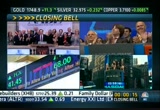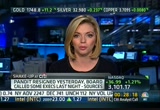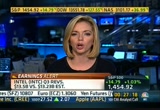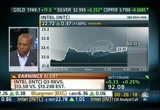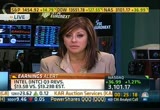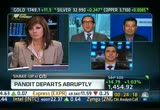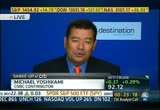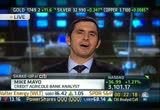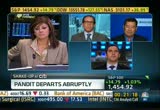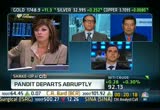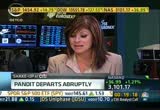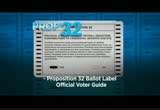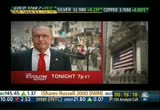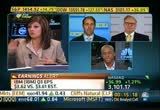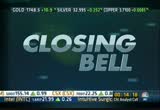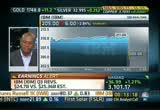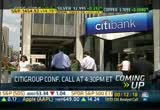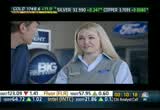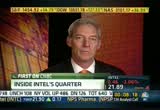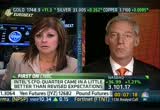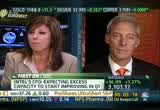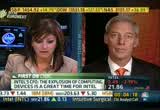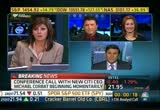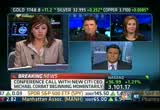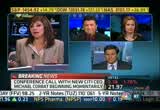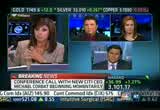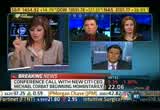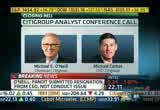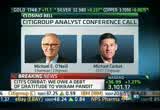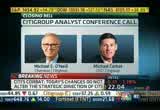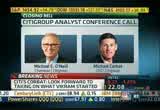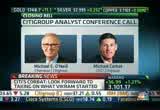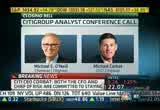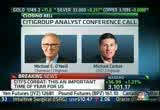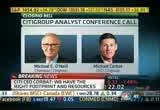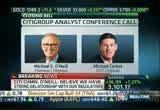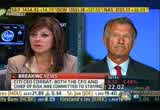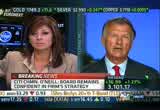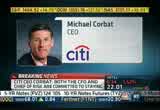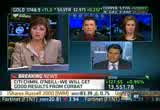tv Closing Bell With Maria Bartiromo CNBC October 16, 2012 4:00pm-5:00pm EDT
4:00 pm
at the close there. going up on the high of the day. do not go anywhere. we have ib m's earnings. we have intel's earnings. their chief financial officer and the conference call coming up with citigroup to get to the bottom of what happened today with vikram pandit. maria bartiromo now with the second hour of the "closing bell." and it is 4:00 on wall street. do you know where your money? hi, everybody. welcome back to the "closing bell." i'm maria bartiromo on the floor of the new york stock exchange. take a look at how we finished date on wall street. tripl triple-digit move, ending up 126 points. up about 1% on the dow. nasdaq also powering forward. technology one of the leadership groups today. the nasdaq composite up on the session 37 points. the s&p 500 also in the green today with a gain of about 15. it's not all about today's rally and not all about markets.
4:01 pm
wall street preparing for citi's conference call coming up at 4:30 p.m. eastern time, 30 minutes away, after the shocking resignation today of ceo vikram pandit. you can hear that call straight away live coming up in a few minutes. we'll take you on that call. kayla is here first with this evolving story. over to you, kayla. >> thanks, maria. we have -- i want to run through what we know so far right now. let's think about this turn of events for citigroup and how this came about. we know from sources that the board has been ramping up this search for the last several weeks. we don't know exactly the catalyst for that, but they did start planning for succession back in august. now, as far as what we know, maria, vikram pandit told you that he gave a call to citi board chairman mike o'neill after the earnings call yesterday to discuss the fact that he was ready go. now, in the wake of that period of time, we don't exactly know what happened during those last few hours. we know that mike o'neill did
4:02 pm
call several members of the operating committee last night and informed them before a full committee call this morning right before that press release came out. now, the escalation of that ceo search, as i mentioned, we'll hope to hear more about how that happened on today's call. i want to take your attention to a bernstein research note pointing out that o'neill has been canvassing shareholders for the last several months since he came on the board if april saying he's been meeting with shareholders discussing the direction of the company and soliciting shareholders' view. as for further personnel moves, we have learned that chief risk officer brian leach, who's a key ally and a co-founder of the old hedge fund, that he's not planning to leave the bank any time soon. another source saying that don callahan is also unlikely to part ways. i also reported in the last hour some suggestions for citi
4:03 pm
insiders as far as who's highly regarded within the ranks as possible successor to john havens, the outgoing c.o.o. james forese has been mentioned. i've learned he's not currently being considered for that role. >> all right, kayla. thank you very much for that. we'll keep watching that. other break news. sbrel just reported earnings. reporting 58 cents a share for the quarter. that compares to 49 cents a share for an estimate. revenue coming in at $14.5 billion. the numbers just coming out for the third quarter. let me get to john fort with more on the intel quarter. over to you, john. >> maria, got some good news and some not so good news from this report. as you mentioned, revenues and eps came in a little bit better than the street expected based on that warning that intel gave on september 7th. but the guidance here, i'm looking through those numbers.
4:04 pm
they're guiding to $13.6 billion in revenue in q-4, plus or minus $.5 billion. gross margins, this is nongap gross margins of 57 or 58%. now, normally in q-4, you've got a big consumer push. so from the holiday season. so gross margins are low. that's a bit lower than some of the analysts that i've been talking to were looking for. of course, as intel mentioned in the warning, a big culprit of this revenue miss that they warned about a month ago is the pc client business being down 8% year over year. that reflects what we saw from the gartner numbers just last week. >> all right. thank you so much, john. we're going to be talking with stacy smith, the cfo of intel on
4:05 pm
the numbers momentarily. they look, as you just heard, better than expected. let's check the stock price on intel shares right now on the heels of these earnings for the third quarter. 58 cents a share versus an estimate of 49 cents a share. the stock is trading higher as a knee-jerk reaction to these third quarter numbers on $13.5 billion in revenue. we've got a great panel to digest all of this right now. good to see you, gentlemen. thank you so much for joining us. we just got the intel numbers out. that's one area that we want to go to. first, let's talk about the citigroup story, sort of the stunner of the day. josh, what do you make of what we learned today? >> first of all, good riddance. he's had several years to do something by way of redefining the culture of the company.
4:06 pm
the strategic vision of the company. we don't knstill don't know wha company is. we have an opportunity here for citi's executive board to really start forcing those changes. obviously, they've been selling off businesses. i expect that to continue. the question is, what are they going to be when they grow up? hopefully we're at front of starting to see a definition of that. >> michael, i think they've been very clear about what they want to be, as you say, josh, when they grow up. that is the bank to the international economies, the bank to the emerging markets as well as the commercial bank in the u.s. have they achieved that status? we know that the company was the international name to know in banking. did they lose that? >> they did for a while, obviously. i think if you look at the last earnings report, it does show they have international traction. you know, the resignation, to me, maria -- and everyone is going to have their theories. i don't think the conference
4:07 pm
call will really clear it up. in my view, it's probably a compensation issue. vikram, as you mentioned in your conversation with him, said, hey, remember i'm the guy that was paid $1. i think vikram remembers he was paid $1 as well. he comes out with a good earnings report. at this point, he's probably saying, in my view, pay me like my peers. if that's not the case, time for a transition. >> that was my analysis after speaking to him. he said it was my decision, my idea, we've accomplished what we should accomplish, now it's time to go. i just felt like there was something more there. he probably went head to head over his pay package with o'neill. >> sure. he's being a loyal soldier. he's doing exactly what you should do as a professional. the fact he's not telling you he's going to go out to pasture and retire means he's not done. this was just not the right fit right now. >> michael, what's your take? also, what about michael corbat? what should we know about him? >> let me just say, this is not about the expense control at
4:08 pm
citigroup the last two quarters or how fast emerging markets is growing. this is a decade-long failure to have proper corporate governance at the top of citigroup. it certainly continued and got exasperated under vikram pandit. it relates to oversight, disclosure, pay. so this goes to the guts of the corporation and the challenge and opportunity for michael corbat is to change that culture so that they care more about shareholders. you've heard about too big to fail, too big to regulate, and too big to manage. i would say citigroup under vikram pandit was too big to care, too big to care enough about shareholders to give basic disclosure. on yesterday's conference call, the company would not disclose their value at risk, a very fundamental issue about how much risk you're taking in trading. they wouldn't even disclose that. it's an attitude they're too big to care.
4:09 pm
no longer should citigroup be above the fray. by the way, thing conference call in 20 minutes is a good start. mike o'neill, the chairman, who i respected, especially in the 1990s when he was cfo at bank america, i think it's a good start he'll be on the conference call, but they have a long way to go. >> it's really interesting because it's true. the value at risk is something that investors want more clarity on. at this point, you know, one of the questions i asked vikram pandit today in my conversation with him after this news was out was, is there something on the horizon that we need to be aware of, something about the derivatives portfolio? is it going to look excessive? what about value at risk? he said, i wouldn't be walking away from this firm if there were any red flags or disasters on the horizon. i walk away believing that this company is at its peak. michael, bottom line, you're an
4:10 pm
invest investor. you want to put new money to work in citi now? >> yeah, i think citi is -- here's where it fits. you're not buying goldman sachs. you're buying a turnaround story. you're buying emerging markets and turn around. we were fortunate. we bought the bank after it had collapsed down. i still think right now there's still 20% upside in this stock. i might also add, maria, the chairm chairman, rand bank of hawaii, that's a more notoriously well-respected institution. i have to believe that probably led up to this issue today as well. >> well, these are two different animals, right? you have the commercial side of the business and the institutional side of the business. it's also what i was hearing earlier. they were certainly at odds. gentlemen, great insights. we appreciate your time tonight. we're looking at the earnings fro out from intel.
4:11 pm
4:13 pm
extra curricular activities help provide a sense of identity and a path to success. joining the soccer team. getting help with math. going to prom. i want to learn to swim. it's hard to feel normal, when you can't do the normal things. to help, sleep train is collecting donations for the extra activities that, for most kids, are a normal part of growing up. not everyone can be a foster parent... but anyone can help a foster child.
4:14 pm
welcome back. earnings flowing right now. intel and ibm reporting quarterly earnings just moments ago. ibm is trading down. company reported $3.62 a share. revenue coming in at $24.7 billion, slightly below the estimate. we're breaking down the numbers now. thank you so much for joining us. let's talk first, ibm. we had the intel numbers out already. dan, what's your take on the ibm quarter? >> from what i can tell so far, it looks like the revenue number looks a little short. we don't have guidance yet for the next quarter, that being the fourth quarter. initially looking at it, i would say revenues look a little light. i'm sure that's why the stock is reacting wait it is now. >> ibm has been one of those few companies in technologies that
4:15 pm
has been able to do very well in up cycles and down psychs. we heard from hewlett packard. we heard from others in technology today. what are you expecting to hear from management? >> well, i'm hopeful, maria, we'll get some overview on some of their growth areas. for example, they've got cloud coming out, which is really big for them. they're into business analytics. also, emerging markets. also, the big push towards software. we know that's their -- 50% of revenues by 2014 are supposed to come from software. those are some of the areas that are real growth components going forward. >> alex, on intel, the numbers were better than expected. the stock traded up. the quarter looking like it's better than expected. what's your take? >> it was a little bit better than expected. it looks like intel is showing it's got a little fight left in it. i don't think it answers any of the longer term questions facing the company. namely, what happens with the
4:16 pm
advent of the tablets and ipads. we've got rumblings of an ipad mini coming now next week. i think intel still has a lot to prove in terms of how it can compete in this new era of mobility. so i think that's the pressure and the head wind facing the stock. we like the fight left in the company. we think the dividend yield is attractive. i'm not going it get too excited over these near-term results. >> very good analysis. let's not forget, they're guiding revenues. what's your take on that? this guidance here could be an issue. >> yeah, it could. mari maria, we're used to ibm raising guidance on a regular basis. they've got us on this sort of cadence of always raising the expectations. the revenue is short here. the u.s. business was down. sorry, the americas business was down 4%. i always like to look at services backlog. that is pretty much steady at
4:17 pm
$138 billion. up 1%. so you know, one way of interpreting this is sort of treading water. you want to see what the next quarter looks like. hardware was down 13% this time. some people were hoping for maybe a little more contribution from hardware. really, the story is about software and services. software doing okay. services treading water. you kind of want to see how ibm gets affected at the end of the year. >> all right. just to be clear, i was talking about intel on the guidance on revenue there. >> oh, you were. >> $13.6 billion versus an expectation of $13.7 billion. gross margin guidance to 57% versus an estimate of 62% for next quarter. that is the guidance on gross margins. ibm trading down. intel trading up. gentlemen, thank you very much. intel just releasing numbers moments ago. i'll be talking with the cfo stacy smith next in the first on cnbc interview. he hasn't spoken with analysts yet. keep it right here so we find out exactly what drove the quarter at intel.
4:18 pm
then citigroup holding its first press conference on the management shake-up. that's in eight minutes from now. keep it right here. we're going to take you on that call live 37 vikram pandit telling me today it was his decision to resign. more from my conversation with pandit coming up. back in a moment on the "closing bell." also, getting reaction today from dick kovacevich, the former ceo of wells fargo. he said pandit should never have been in charge anyway. then a make or break debate between president obama and mitt romney. we'll tee it up ahead of cnbc's live coverage tonight. hope you'll join us for the debail, big one. debate number two. back in a moment. ...you see they all have something very interesting in common. they have teachers... ...with a deeper knowledge of their subjects. as a result, their students achieve at a higher level.
4:19 pm
let's develop more stars in education. let's invest in our teachers... ...so they can inspire our students. let's solve this. mike rowe here at a ford tell me fiona, who's having a big tire event? your ford dealer. who has 11 major brands to choose from? your ford dealer. who's offering a rebate? your ford dealer. who has the low price tire guarantee... affording peace of mind to anyone who might be in the market for a new set of tires? your ford dealer. i'm beginning to sense a pattern. buy four select tires, get a $60 rebate.
4:20 pm
use the ford service credit credit card, get $60 more. that's up to $120. where did you get that sweater vest? your ford dealer. syou know, i've helped a lot off people save a lot of money. but today...( sfx: loud noise of large metal object hitting the ground) things have been a little strange. (sfx: sound of piano smashing) roadrunner: meep meep. meep meep?
4:21 pm
(sfx: loud thud sound) what a strange place. geico®. fifteen minutes could save you fifteen percent or more on car insurance. as you can see, intel began the session after the earnings up. it has now reversed course and is in negative territory. ibm also down on the heels of its earnings where revenue came in a bit light. let's talk about intel. we've broken down the numbers with the analysts and investors. we find out now how the quarter shaped up inside the company. joining me now is the chief financial off, stacy smith.
4:22 pm
good to have you on the program once again. welcome back to the "closing bell." >> hi, maria. good to be back. >> thanks so much. can you characterize the quarter for us? >> yeah, you know, it came in a little belter than the revised expectations. what we saw was some growth in the pc market. then we saw from our customers that they continued to manage their supply line and their orders to us very cautiously. so it's some growth but cautious inventory management on the sieside of our customers. >> seems like that's what we're hearing from a lot of customers. a real cautious attitude toward allocating capital. i want to get into the bigger prospect of the pc business and what's happening with mobility. let me get your take first on the next quarter. everybody wants to know what you're looking at in terms of guidance. are you looking for gross margins to move lower? what's your take? >> yeah, so first on the top line, what we guided for q-4 is similar to what we in q-3. we're going to see growth in the pc market. a little less than seasonal, but some growth. our expectation based on the
4:23 pm
order patterns we're seeing from our customers is they'll continue to manage things very cautiously. on the gross margin, you know, we're seeing less unit growth in the pack half than we expected, so we're taking advantage of that to redirect the space and equipment we had put in lace for older generation technologies and moving that forward to our most advanced process technology. thatly lwill allow us to bring inventory down. we'll start to see those excess capacity charges improve into the early part of next year. >> so you think you'll see a bit of a squeeze on gross margins. what, to 57% versus an expectation of 62%? >> yeah, 57% is our forecast. again, we've made a conscious decision to do that. we'll take excess capacity charges in the quarter, and
4:24 pm
those will get better into early next year. >> you're expecting gross margins to improve first quarter of 2013 or second quarter? is this a second half affair or first half affair? >> we haven't provided a forecast yet for next year, but in terms of the excess capacity piece, yeah, they'll start to improve pretty dramatically when we get into q-1. my expectation is by the time we get to q-2, we won't see any excess capacity charges, and we'll be well on our way towards getting the production capacity in charge for 14 nan meter. >> mr. smith, let me ask you about the windows 8 release. when windows 7 was released in '09, the pc was the main option in terms of accessing the internet. the ipad did not exist p we weren't seeing this surge in mobility. of course, today is a very different story. tablets are the thing to have. expectations that they're going to sell more than 100 million units in 2012. smart phone sales also soaring. how are you positioning the company in terms of taking advantage of this or not being
4:25 pm
left behind as we see mobility really lead the day? >> yeah, i think it's one of the most interesting things that we see right now, which is that, you know, there are these explosion of devices that are computing and connect to the internet. it's a great time for companies like intel where you have all of these devices computing and connecting to the internet. if you compare where we are as we enter q-4 to where we were at the beginning of the year, we have over 100 ultrabook designs coming to the parkt place that we think reinvigorate the pc market. 40 of those are going to be touch enabled. a lot of them are really interesting designs around where they're convertibles and things like that. we have 20 designs in tablets that are coming to the market. we had in essence no representation in that segment of the market. we have phones now in the market with intel inside. you see this market where there's all these devices computing and connecting to the internet. you see intel's straty, where our plan is to have the best products and all of those
4:26 pm
different segments. >> even though a.r.m. is trying to make market share and microsoft is launching the first tablet on a.r.m., your kpelt to be. >> as windows comes to the marketplace, there's six oems with intel inside. so we'll be well represented. we think that the combination of the performance that our silicon brings with combatability makes a super compelling offering. >> stacy smith, we appreciate you talking to us. we know you have to talk to analysts. we appreciate your time tonight. thanks so much. we'll see you soon. stacy smith. citigroup conference call on its management shake-up. it's going to kick off in a few minutes. we'll take you there live. back in a moment on "closing bell." tdd#: 1-800-345-2550 this morning, i'm going to trade in hong kong.
4:27 pm
tdd#: 1-800-345-2550 after that, it's on to germany. tdd#: 1-800-345-2550 then tonight, i'm trading 9500 miles away in japan. tdd#: 1-800-345-2550 with the new global account from schwab, tdd#: 1-800-345-2550 i hunt down opportunities around the world tdd#: 1-800-345-2550 as if i'm right there. tdd#: 1-800-345-2550 and i'm in total control because i can trade tdd#: 1-800-345-2550 directly online in 12 markets in their local currencies. tdd#: 1-800-345-2550 i use their global research to get an edge. tdd#: 1-800-345-2550 their equity ratings show me how schwab tdd#: 1-800-345-2550 rates specific foreign stocks tdd#: 1-800-345-2550 based on things like fundamentals, momentum and risk. tdd#: 1-800-345-2550 and i also have access to independent tdd#: 1-800-345-2550 firms like ned davis research tdd#: 1-800-345-2550 and economist intelligence unit. tdd#: 1-800-345-2550 plus, i can talk to their global specialists 24/7.
4:28 pm
tdd#: 1-800-345-2550 and trade in my global account commission-free tdd#: 1-800-345-2550 through march 2013. tdd#: 1-800-345-2550 best part... no jet lag. tdd#: 1-800-345-2550 call 1-877-561-5445 tdd#: 1-800-345-2550 and a global specialist tdd#: 1-800-345-2550 will help you get started today. sleep train's best don't miss your chanceoon. to get sleep train's very best mattresses at the guaranteed lowest price. plus, pay no interest for 3 years on beautyrest black, stearns & foster, serta icomfort, even tempur-pedic. and rest even better with sleep train's risk-free 100-day money back guarantee. but the best rest event ends soon at sleep train. superior service best selection, lowest price, guaranteed. ♪ sleep train ♪ your ticket to a better night's sleep ♪
4:29 pm
welcome back. busy evening tonight. citigroup's conference call about the management shake-up is set to begin any moment. ahead of that, we bring in jeff cox, kate kelly, and david to talk about what's going on. let's talk about what you're expecting, david. what do you think you're going to hear in a few minutes from o'neill and corbat? >> i guess my expectations are not that high. it's not a jamie dimon
4:30 pm
conference call, meaning he's usually very straightforward. i can remember the whale conference call. very straightforward. we'll see how much they tell us, maria. my biggest question is about strategy. if we're right in thinking there was a division in terms of the strategic direction of the company between its former ceo, mr. pandit, and the board, i'd like to hear from mr. o'neill and the new ceo where they see taking citigroup. my doubt is that they really will get there. we'll see what they have to say. >> kate, they're really going to have some answering to do. just a day ago we get the news that the earnings were better than expected. vikram pandit spends an hour and 40 minutes with the community going through the strategy. a day later we find out he's stepping down abruptly. >> absolutely, maria. i think he did shed some light on the situation in his conversation with you, but there remain a lot of questions unanswered. a few things come to my attention in terms of the board maybe wanting to see him leave. the dividend they weren't able to pay out, the ongoing pay
4:31 pm
flap, which is not pandit's problem. i mean, i guess it is his problem. wasn't necessarily his decision making process. obviously, he was the poster boy for it. also, recently the sheila bair book that came out. everyone knows she's been quite critical on pandit. i've been told there's some consternation between her depictions of pandit and the regulators in 2008. there's some frustration about that. but still, the timing of it remains a huge surprise. i've yet to talk to anybody today who wasn't taken almost totally by surprise. i think on the call, my focus is going to be on michael corbat. let's see how his personality comes out, what kind of a guy he is. we're told he's quite personable and smart and has run almost every aspect of this business at least for a brief time. we'll see if that comes out on the call. >> been there 29 years. and jeff cox, in my conversation with vikram pandit today, he basically said it was his
4:32 pm
decision. i surmised that it was partly about compensation. he agreed to take a dollar a year. i suspect he wants more to be equal to some of his colleagues on the street at other banks. what are you expecting? by the way, the call is expected to start now. it hasn't started yet. as soon as it starts, we're going to end this. >> he's not making a dollar anymore. this whole situation reminds me, i'm a bit of an amateur mob historian. when paul castellano was forced out of the mafia, one of the problems is he was not a street guy. there were other guys who couldn't relate to him. i hear over and over again today, pandit wasn't a real banker. he was this academic technocrat. he didn't fit the culture. >> this is an important point. he comes from the institutional side of banking, having run the
4:33 pm
hedge fund. really knows risk, as opposed to o'neill, coming from commercial banking. i understand they clashed quite a bit. >> absolutely. that's what i've heard as well. i think the point is well taken about pandit being more of the technocrat, being more of a risk manager. by the way, let's give him some credit here. that's exactly what citigroup needed when he took the reigns. what he needed was to rebuild risk management from the bottom up. i just did a story the cro he installed, brian leach, who really had to get rid of 11 of 13 of his staff members, develop somebody who could risk manage in asia or look at a portfolio had horizontally. >> i had one analyst say to me that almost ended up working against him over long run because he became so associated with the crisis that when you saw vikram pandit, you saw the
4:34 pm
government ownership. >> we got to go. the call is beginning i. i'm sorry. o'neill is speaking. >> vikram chose to submit his resignation, and the board accepted it. contrary to speculation, no strategic regulatory or operating issue precipitated the resignation. nor is there another shoe to drop. certainly, there is no issue of conduct or ethics. vikram is a person of impeccable integrity. he successfully led citi through the greatest recession in 75 years, recapitalized the bank, and executed a strategy based on a return to the basics of banking. his accomplishments have been essential to making citi a stronger global enterprise and is well positioned for the future. the board elected unanimously mike corbat as vikram's successor because we believe he
4:35 pm
has the ideal experience and pron track record as a leader. because we believe he will place a special emphasis on sharpening the company's focus on achieving sustained, strong, operating performance. in fact, mike, for some time, has been at the center of the board's comprehensive management and ceo succession planning process. mike has demonstrated his ability to execute over nearly three decades at the firm. he was the ceo of citi holdings from its inception where he managed to wind down noncore assets. since the beginning of this year, he was ceo of amia where he was successfully managed our business in the midst of a difficult operating environment in that region. in summary, the board remains confident in his strategy in the firm, including the strength of our core franchise in citi corp. and the wind down of the legacy
4:36 pm
assets in citi toldings as demonstrated by our excellent third quarter results. with that, i'll turn over to mike corbat. >> thank you. let me add to mike's comments that we owe a debt of gratitude to both vikram and john havens. they led our firm through an extremely challenging time in our history, and under vikram's leadership, we recapitalized the balance sheet and built the financial strength you saw in our quarter eerly results yest. we adopted a focus strategy of core businesses in citi corp. that played to our unique historic strengths as a global bank that will provide strong growth aattractive returns over the long term. we identified noncore assets in citi holdings of which we've shed over $650 billion in just four years. a record few can criticize. lost in question that vikram laid the foundation to support citi's long-term growth, so to be clear, today's changes do not
4:37 pm
reflect any desire to alter the strategic direction of citi, which we believe to be the right one. i've spent a good part of today with members of our senior management, and without exception they are committed to our firm. i've been asked about brian leach, our chief risk officer, and our chief financial officer. both are committed to staying. we'll continue to focus on growing citi corp.'s core businesses, particularly those where we have a unique presence in the world's fastest growing markets. we'll remain focus the on shedding the remaining assets in and minimizing any negative financial impact in citi holdings. that is and will remain a priority of ours and in particular of mine, as you know i had responsibility for managing holdings until this year. critical to the ongoing execution of our strategy across
4:38 pm
both citi corp. and citi holdings, we'll remain extraordinarily focused on our efficiency ratios and overall expense levels. citi is an extraordinary organization with tremendously talented people, a unique global presence, and a historic franchise that we will continue to honor. our strategy is unique and well positioned for where we see the world going. i look forward to taking on the challenge of continuing what vikram started. with that, mike and i are happy to answer any questions. >> at this time, if you would like to ask a question, press star followed by the number 1 on your telephone key pad. if you'd like to withdraw your question, press the pound key.
4:39 pm
your next question comes from ubs. >> hi, mike. congratulations. >> thank you very much. >> you are clearly very successful in the wind down of assets that started when you took over holdings. when you take a look at s.a.p. assets and lcl assets, the decline rate quarter over quarter has slowed here in 2012. do you think there's something that can be done to reverse that, and after you moved on from running holdings, did the strategy to remove assets change at all? >> it didn't. we've left holdings in extremely good hands with mark mason and the team. i think as you know, mark and i worked together for the entire three years when i oversaw the business. i think part of it is that as we look at the remaining asset it is a are in there, we continue
4:40 pm
to look at the economics behind those assets, and we continue to take advantage of the markets when they offer the right opportunities to sell. i think some of those assets in the portfolio today, we think in this environment, based on current market prices, are better to continue to hold and collect out. when the opportunities present themselv themselves, sell. as though opportunities present themselves, we will take advantage of that. >> okay. so you don't necessarily see any change in direction as far as holdings go and any of that? >> no, i don't. >> okay. taking another direction here, when you look at recent ipo of a bank in mexico, as an example, you know, i've heard several investors make the argument that citi may not be getting full credit for the assets it holds. are you willing to consider actions to unlock value that may have been off limits by prior
4:41 pm
management? >> i think that, you know, i'm coming into the job, and what i've said, i'm going to take a look and a fresh assessment of things. i'll look at those things and see what the numbers say and what that means, then we'll make decisions from there. >> okay. okay. last one for me, taking maybe a step back, you know, at a really high level -- and i probably should have started with this one. what do you expect maybe to do differently than prior management? i know you mentioned you're not going to take any dramatic change of strategic direction, but is there going to be a change of focus? is it going to become -- you know, now that the ship feels more righted, that there will be a focus on becoming more of an operator versus, you know, the roll-up that citi had a reputation of?
4:42 pm
>> i can't speak to necessarily what i'm going to do differently, but i can tell you what i'm going to do and what i'm going to focus on. so first thing is this is a very important time of year for the company. we are in budget and strategic planning season. we have a budget that i need to work together with the business heads to deliver by year end. we're in c-car process. we have a document to deliver by january 5th. so those are going to be things that obviously i'm going spend time focused on. i think from an overall perspective, i think as mike said, the focus is really on operating performance and a real refined focus around that. again, i think we've got the right footprint. we've got the right resources, and it's up to us to make sure we use those properly. that's what i'm going to be focused on. >> okay. thanks for the questions. congratulations again. >> thank you very much. >> your next question comes from the line of john mcdonald with stanford bernstein. >> hi, i had a question for mike
4:43 pm
o'neill. was wondering if you've gotn to know the company over the last seven or eight months as chairman, what kind of lessons learned or takeaways did you have from shareholders and regulators on two issues. one, the c-car process and citi's communication and relationship with regulators, if there's any kind of takeaways you had on that and goals you have with respect to that. also, in terms of the shareholders' rejection of vikram's compensation package and what your takeaways and goals are on that issue. thank you. >> two good questions. let me start with the regulatory issue. i will tell you that it is, i think, critical for this firm and actually all firms in banking to have strong relationships with our regulators. i think we do. as in all things, i think things can always be improved. we will focus on that.
4:44 pm
it is an important part of being in our industry. i have every confidence that mike will have strong relationships. he already has some very good ones built in his role at holdings. needless to say, thes took a real interest in progress, and i can tell you having been with him on a number of those visits that he is very well viewed there. so from a regulatory perspective, i think we're in good shape and likely to get better. as it relates to pay, i've been clear that until we are finished going through the process, which is complicated and which needs to be comprehensive, we're not going say very much. we have made a statement that says we are talking to our investors. we have spent a lot of time doing that. i think we know what the issues are. we are addressing them.
4:45 pm
i think you'll have a complete understanding of the approach we're taking. >> okay. thank you. >> your next question will come from the line of credit swiss. >> -- that budgeting process. i think that, you know, one of the trends that had troubled investors during 2011 about citigroup and maybe in the very early part of 2012 was the element of expenses relative to revenues. can you share any preliminary thoughts about how to think about costs, you know, and whether it's specifically as part of a business like the investment bank or just generally could you give us some thoughts on that? >> i apologize. the first part of your question was cut off. so if you could just give me the
4:46 pm
first lead in. >> sure. in basically, given how important cost control has been and how that was a big issue for the company in 2011, the company's made a lot of progress. as you're sitting down as part of that budget and strategic planning process, just give some more detail in terms of your thoughts about the company's cost structure and how it should evolve over the next couple years. >> all right. we are listening to the conference call with analysts and investors on the heels of the shake-up out of citigroup. no strategic or operating issue precipitated the resignation, according to mike o'neill, the chairman. no issue of ethics, accomplishments from vikram pandit have been essential in making it a successful firm. we heard from mike corbat, the incoming and new ceo. so far he does not seem to be changing strategy. we're going to get reaction on this. we have the former wells fargo
4:47 pm
chief dick kovacevich with me now. also rejoined by jeff cox and david faber. dick, let's talk about the situation as we know it. as we listened to this conference call, was pandit not the right man for the job to begin with? >> i think if you look at the massive challenges that citi corp. faced at that time and compare that to vikram's resume, there's a disconnect. i don't know that an asset manager and a hedge fund manager has the knowledge and experience and the deep experience over a long period of time to address the challenges that citi corp. faced. this is not vikram's fault. experience is experience. he didn't make the choice. i just think there's a huge disconnect between what they faced and the experience that
4:48 pm
vikram brought to the party. >> yet, it feels like shareholders have tolerated or held his hand throughout this tumultuous period, even though the stock was down 90% since he took over. you've been a student of this business for a long time. you came up with the idea of an atm, right, when you were at citi corp. what's your take on what went on here, dick? >> well, i think what happened is that a number of new directors came to citi corp. between the time that vikram was selected and now. i know some of those directors. i believe their business philosophies, their experience, their style, and their personals are different from vikrams. there may well have been some discussions and thoughts that there was a difference of opinion of how citi corp. should go forward. i have no inside knowledge of that. certainly wouldn't surprise me that there could have been some
4:49 pm
serious differences between certain members of the board and vikram. >> of course we know that there was a pretty good fight in a lawsuit over the wachovia deal. wells fargo, your former company, won the wachovia situation. citi wanted it badly. how bad was that for the overall strategy at citi? >> well, you know, i guess i would start with i cannot imagine, given the challenge that citi corp. was facing at that time, that they would even be allowed to pick up the challenges of wachovia. there's all kinds of suppositions of what was really going on there. we probably don't have time to discuss it. you know, what really happened with wachovia is that we were told that the only problems with wachovia were consumer loans. in fact, we discovered there were big problems with commercial real estate and investment banking. we asked for another 48 to 72 hours so we could address those issues. we were told that we didn't have
4:50 pm
that time, that it had to be done that night. for some reason that totally escapes me, citi corp. was allowed to bid, and i still believe our bid that night was so there's some very strange things going on at that time and it was actually beneficial that citicorp didn't have those kinds of problems. >> we heard earlier ask mcneil ask about the terms of unlocking value. in mexico, we saw a successful feel. what would be your take on getting this ship righted at citi? should they be ipo'ing? >> i think having minority shareholders when you're trying
4:51 pm
to run a business, especially when they're outside shareholder. i'm biassed, i think banks could be basic commercial bankers, you should just do regular commercial banking. if you get back to the basics i think citi corp can be successful. >> his resume is certainly much stronger in areas that -- so, just from that standpoint and i must say that i heard from other people who particularly in the past few hours, that he is
4:52 pm
highly regarded. but i do not know. and real quick on making money and banking right now where interest rays are, what would be your sense of the profitability of your entire sector given the level of rights and the level of the anemic pace of growth in the economy? >> i think the sector will be challenged because of low interest rates and regulations are probably even more troublesome than low interest rates, and to slow the economy not only in the united states but around the world. i think there are institutions because of those various problems can take advantage of that situation that can gain market share and actually do quite well and i think wells fargo has demonstrated the ability to do just that. it has had 11 straight quarters of record earnings and has
4:53 pm
pulled as many levers as they can pull. and i think the market share gained by wells fargo is the best that we have ever done. the sector is trouble, but that doesn't mean that every participant in that sector can't do well. >> was it a mistake to let smith go? >> i don't know the answer to that question, other than you do need to slim down and focus and i think that's certainly one of the prime areas that you perhaps need to divest of versus the more commercial level of investment banking. >> thanks so much for joining us, we'll see you soon. we appreciate your time. former ceo of wells fargo, we'll take short break and we have got more reaction to the citi conference call. back in a minute.
4:57 pm
shake-up conference call talking about the unexpected management changes at the company, we're going to get the final thoughts here, with the team at home. kay, what did you learn? >> the reaction to that call sort of reflected the reaction of today. you heard dick saying he's never met him before, he doesn't know him but his resume seems very relevant. once they got past the nitty gritty questions, there were some questions about regulatory issues perhaps. mike corbett has very good relationships as a result of the investments he had to do at citi holdings. >> o'neal said that he handed in
4:58 pm
his resignation, and mike at the center of the succession process, so we were ready. no real details in terms of what went on here and why so abrupt. >> analysts, we need to be reminded are not journalists and they're not asking those key questions that we all want to understand. he was talking got a more muscular board, one that oversaw the reign of chuck prince, for example. that does not appear to have been a well planned succession. let's make no mistake about that, you don't have an earnings call one day and then 24 hours later say your ceo is leaving. that's not the way you handle it at all. it didn't affect the stock market, citi stock at all. >> i think that's a great point
4:59 pm
that david makes. i had a note from an analyst that there could be some regulatory issues with the way the whole thing was handled. market reaction was okay today, i think this story is far from over. michael o'neal during the press conference made the point that there's no -- >> they're trying to push the regulatory, legal, ethical issues right off the tail and let us know that they have been planning this process for a while now. they have had mike corbett in place for a while now. they have had a succession plan, and if he was the -- >> and my own reporting suggests that part of this has to do with compensation, although mike o'neal is denying that the
232 Views
IN COLLECTIONS
CNBC Television Archive
Television Archive  Television Archive News Search Service
Television Archive News Search Service 
Uploaded by TV Archive on

 Live Music Archive
Live Music Archive Librivox Free Audio
Librivox Free Audio Metropolitan Museum
Metropolitan Museum Cleveland Museum of Art
Cleveland Museum of Art Internet Arcade
Internet Arcade Console Living Room
Console Living Room Books to Borrow
Books to Borrow Open Library
Open Library TV News
TV News Understanding 9/11
Understanding 9/11